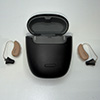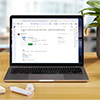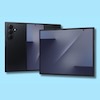After a 10-year run, Microsoft ended support for the Windows 10 operating system on October 14. Users have to upgrade their PCs to Windows 11 to keep getting bug fixes and security patches. (There's one exception to the latter, discussed below.)
But many older PCs don't have sufficient hardware to run Windows 11. Refurbished-tech marketplace Amazon Renewed has continued to offer non-upgradable systems weeks after Windows 10's end of life, with several still listed at publication time. As a follow-up to our earlier reporting on obsolete PCs for sale, Techlicious identified dozens of refurbished PCs – laptops and desktops – listed on Amazon Renewed that do not meet Microsoft's minimum hardware requirements for Windows 11. Most listings make no mention of this limitation, and several claim that the systems are running Windows 11. These are generally low-priced laptop and desktop models: almost all under $300, and most under $200.
Amazon is not the direct seller of these PCs. As with many new products listed on Amazon, Amazon Renewed serves as a marketplace for third-party sellers. The company told Techlicious that it works with its approved sellers to keep products with outdated software, including Windows PCs, off the site. Based on our research, this process is still ongoing.
Amazon's progress contrasts with Back Market, another marketplace for sellers of refurbished tech products. Techlicious did not find any obsolete PCs listed on Back Market. Web searches did reveal links to such systems, but they returned a 404 page not found error message when we visited them. Our research could not, however, determine how recently these pages might have been taken down.
It's important to note that we were not able to conduct an exhaustive search of Amazon Renewed, Back Market, or other sites. Our findings are based on large but not all-inclusive samplings of listings.
What we found on Amazon
We sent Microsoft links to 32 listings on Amazon Renewed (active as of October 25), with each listing generally offering multiple units of the advertised model. On October 28, Microsoft confirmed that none of them are able to be upgraded to Windows 11 and thus are not eligible for continued mainstream support. All the systems feature Intel processors that predate the 8th-generation Core line, generally Microsoft's minimum hardware requirement for Intel systems running Windows 11. Microsoft publishes requirements for both Intel- and AMD-based systems on its site.
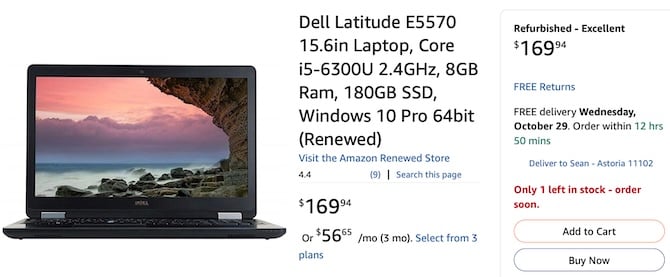
None of the 32 listings we sent to Microsoft informed buyers of this limitation. Seven listings (all desktop models) claimed that the PCs had Windows 11 installed. There are multiple hacks to bypass Windows 11's hardware checks and install it on obsolete systems. Microsoft's site states that it does not offer support for these installations, that they might malfunction due to other hardware incompatibilities, and that they may not be able to install updates, including security patches. Techlicious did not examine these systems and could not determine if or how Windows 11 had been installed.
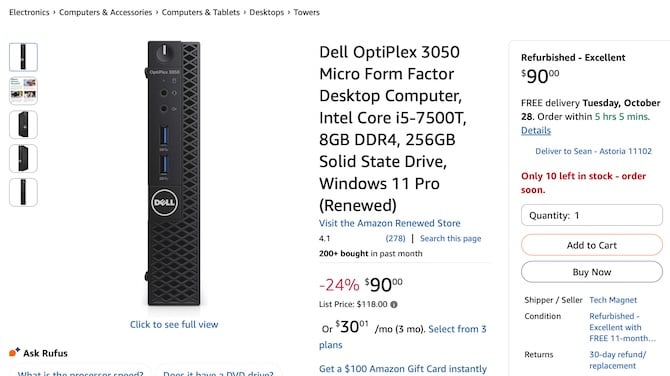
We sent the list to Amazon, which confirmed Microsoft's findings on October 31. "We work closely with our selling partners to ensure relevant products on Amazon Renewed meet operating system support requirements," the company said in a statement to Techlicious. "As part of our ongoing efforts, we had already proactively removed the vast majority of devices that didn't meet these requirements, and have now removed these additional identified devices as well," reads Amazon's statement.
On November 1, Techlicious confirmed that all 32 listings had been removed. But a spot check on November 3 found 19 additional systems with Intel or AMD processors not on Microsoft's supported list. For instance, we found PCs with the Core i5-6300U and Core i5-6500 chips – two generations too old for Windows 11. We've sent this additional list to Amazon.
Misleading Listings
Listing Windows 10 systems that can't be upgraded could be an oversight by third-party sellers, or a lack of clarity about whether and until what date listings for non-upgradable PCs would be. "We continue to guide our sellers through this process," Amazon said in its statement to Techlicious. But claiming that such systems run Windows 11, or installing it in an unorthodox manner, hints at a more active role in passing them off.
Both Microsoft and Amazon confirmed that listings from sellers, including BuyRefurbished, Quality Recertified, STG USA, Tech Magnet, and TekRefurbs, featured purported Windows 11 systems that lacked the required hardware to run the OS.
Buyer Beware
While Amazon and Back Market do have policies against listing such systems, that's not the case for all secondhand marketplaces, such as Swappa. In an email, chief technology officer Michael Lipson said, "At Swappa, we don’t actively remove listings for products based on operating system end-of-life or compatibility status. Including PCs that can’t run Windows 11. Our goal is to make sure listings are accurate and devices are fully functional at the time of sale, so buyers can make informed choices."
However, these informed decisions are difficult for several reasons. For one, consumers would have to know that Microsoft has ended support for Windows 10. They would also have to know that vendors are still selling obsolete systems, and they would have to check any listing they were interested in to see if its processor was on the long list of supported chips on Microsoft's site.
Back Market says it is taking the role of informing consumers. "Back Market offers non–Windows 11-compatible computers in a dedicated category called 'Obsolete Computers', " said the company's global head of brand activism, Nina Quellier, by email. "We clearly explain that these PCs cannot run on Windows 11 and that support for Windows 10 is ending, making them technically 'obsolete.' However, we emphasize that they can remain functional and secure with alternative operating systems." The company has advocated installing Google's ChromeOS operating system. New ChromeOS-based systems also offer an option for computer buyers on a budget (which we discuss below).
There is one other option for obsolete PCs. Microsoft's Windows 10 Consumer Extended Security Updates (ESU) program provides patches for newly discovered security vulnerabilities through October 13, 2026. Microsoft offers the ESU for free if you sync your PC settings to OneDrive, or for $30 or 1,000 Microsoft Rewards points if you prefer not to. The program does not include any updates for bug fixes.
How to return an Obsolete PC
"Customers who have purchased these devices are protected by the Amazon Renewed Guarantee," the company said in its statement to Techlicious about the obsolete PCs. Amazon's renewed Guarantee typically provides a 90-day window to return products. However, the page states that "select" items have a 30-day return period, followed by an 11-month warranty against "defects in material and workmanship." We found listings for obsolete PCs with both types of coverage.
Back Market's site states that a buyer has 30 days from the date they received the item, "to change your mind," and receive a refund. Back Market also requires its resellers to provide a 12-month warranty against "defects in materials and workmanship."
Swappa's site states that "Sellers are required to accept a return for items that do not meet our listing criteria." These essentially require that products be fully functional as they were in their original state. The ability to update the operating system to a fully supported version is not listed in the criteria. Sellers are not required to accept returns due to "buyers remorse."
How to get an inexpensive, up-to-date computer
There are still relatively inexpensive refurbished systems that do support Windows 11, and even capable new PCs under $500 or $600. Make sure, though, that they exceed the bare minimum requirements for running Windows 11. For instance, go for at least 16GB of RAM instead of the baseline 4GB, and at least 128GB of storage instead of the baseline 64GB.
Another option is to buy a computer running Google's web-focused, AI-enabled ChromeOS. Most of these systems are Chromebook laptops, but Chromebox desktops are also available from several vendors. With so many applications now online – such as web-based email, Google Docs, Notion, Trello, Spotify, Asana, and many, many others – you may not need to install native apps made for Windows or macOS. ChromeOS can also run Android apps.
As with Windows 10 today, expiring software support had been a concern for ChromeOS in the past, with Google providing updates for as little as three years. In 2020, Google extended that to 8 years, and in 2023, it increased the ChromeOS support timeframe to 10 years of automatic updates for systems launched in 2021 or later.
You can easily find well-reviewed basic Chromebooks under $300, such as the Lenovo Chromebook Duet Convertible, currently listed for $249.54 (on Amazon). These systems involve some compromises, such as 4GB of RAM and 64GB hard drives. However, these tend to be less of a concern with the lighter-running ChromeOS and its focus on web-based apps. You may have to settle for a smaller screen, too, such as the Duet's 10.95-inch model (though it offers a respectable 1920 x 1080 resolution). Extend your budget to over $300, and you'll find Chromebook Plus models, such as the $315 Acer Chromebook Plus 514 with a 14-inch touchscreen, 8GB of RAM, and a 512GB SSD.
In short, you can find a quality computer that will serve your needs for a reasonable price. But beware prices that look too good to be true. And especially keep an eye out for older tech products – PCs or other devices – that have gone or are about to go obsolete.
Read next: AI, OLED, and 17 Hours of Battery Life – On a Chromebook? Yes.
[Image credit: Microsoft, screenshots via Sean Captain/Techlicious]

